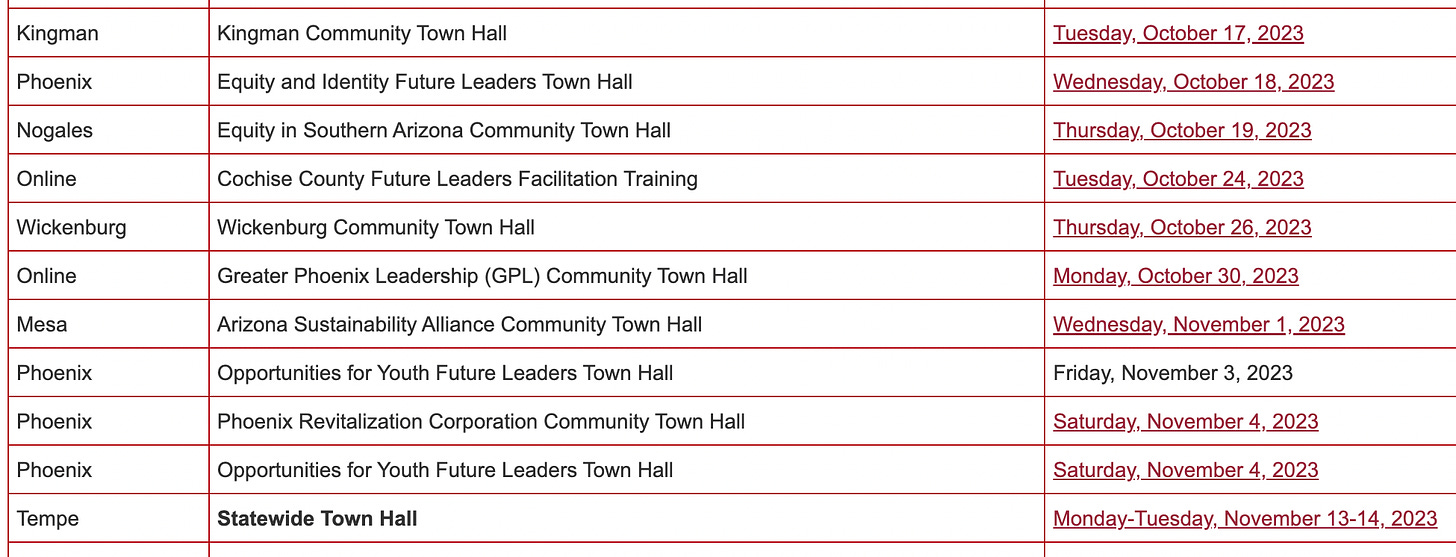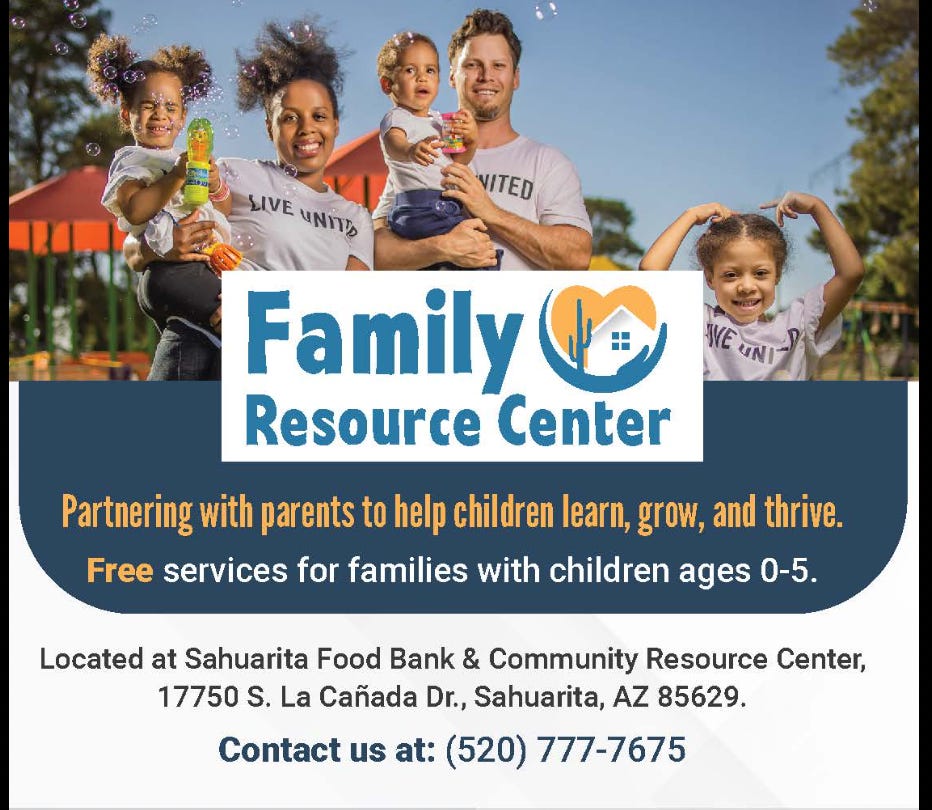The Daily Agenda: Some conversations are harder than others
Town hall takes on equity … Report coming next month … Water council falling apart.
In recent years, we’ve seen a push in Tucson and other municipalities to distribute resources based on equity, rather than equality.
Equity is a key feature in many of the City of Tucson’s recent policies. We’ve reported on a handful of these efforts, including the city’s use of a shade equity index to determine where new trees should be planted and the creation of an equity dashboard to help figure out what parts of town are in the greatest need of specific services.
That’s why it’s important for everyone to be on the same page about what equity really means, and a longstanding Arizona nonprofit has spent the last eight months trying to gather information for exactly that purpose.
Applying equity to government programs and spending is full of potential. The simple fact is a child born to wealthy parents is probably going to face fewer challenges than a child being raised by a single parent working two jobs to pay the bills. Government policies that keep this in mind are more likely to get closer to addressing real problems in the way they need to be addressed.
But for attendees at a recent town hall and for many other people, it’s almost overwhelming to think about, since there isn’t a playbook for creating and maintaining equity.
A few dozen Tucsonans wrestled with the topic last week during an event at the YWCA, in collaboration with Arizona Town Hall. The event was one of a series, “Equity for all Arizonans,” that are being held across the state. The series culminates next month in Tempe and the final report with suggestions from participants will be sent to lawmakers, elected officials, community leaders and service providers to help inform decisions about distribution of resources.
One hurdle they had to deal with was very basic: What’s the difference between equity and equality? They may sound alike, but they’re very different.
In a nutshell, equality is focused on giving everyone the same opportunities without considering their circumstances. Equity is a need-based approach that acknowledges everyone’s starting position is different and allocates resources accordingly, with the intent of giving everyone a chance to succeed.
Basically, while it’s a nice idea to give everyone the same pair of shoes, it’s a better idea to give everyone a pair of shoes that fits.
Arizona Town Hall is a nonpartisan group that educates and empowers residents to address societal problems. For more than 60 years, town halls focusing on issues like criminal justice reform, mental health, substance use and homelessness have taken place in communities across the state, culminating each year in a statewide event that brings together participants from across the state to share the ideas their local gatherings generated.
Arizona Town Halls aren’t your typical town halls, with experts presenting on topics and an opportunity at the end for questions and feedback. In these town halls, community members are the experts, discussing topics in small groups and learning from one another.
One of the attendees at last week’s event pointed to the rollout of the COVID-19 vaccine as an example of a situation that was equal, but not equitable. While the distribution plan provided equal access for everyone, the primary way people were meant to sign up was online. Since not everyone has access to the internet, a more equitable approach would have been to design a system that made it easier for people to schedule appointments by phone or in-person.
More than a dozen town halls have already taken place and several more are scheduled for Bullhead City, Wickenburg, Nogales and a few other municipalities. Organizers are trying to get as much feedback as possible before the Nov. 13 and 14 statewide gathering and culminating event in Tempe.
Participants in last week’s events were asked to talk about how equity impacts their own lives, but also consider new perspectives. The questions posed were:
How do you define equity? To what extent has it impacted your personal or professional life? Consider the difference between equity and equality.
To what extent is an equitable approach important for optimizing the potential of people, communities, and our state?
Where are the greatest opportunities to use equity as an approach to improving our community?
What actions should be taken and by whom to address the opportunities identified in response to question 3?
What one action will you commit to take?
One person from each table was asked to speak on behalf of the group, with a recorder on hand to take note of what was said and give participants the chance to suggest changes or additions before entering the answers into the final report.
Topics addressed included perceived equity shortages in healthcare, education, transportation, internet access, language barriers, housing, voter access and more.
The City of Tucson’s Chief Equity Officer, Laurice Walker, said there needed to be more communication between the government, community-based organizations and members of the public. She urged attendees to “tap into their networks” and start collaborating.
But it’s even more important, she said, to address the historical inequity that many communities have faced and continue to face.
“What we’re missing from the conversation is the social construct of equity, and that it’s not just a policy thing. What’s important is that it has not been equal for generations and historically causes a lot of trauma that we don’t talk about,” she said. “That’s a big piece when you talk about equity because we have to address historical trauma. We’re still fighting for people of color to have their lives be valid and to be treated equally. We’re still not there.”
Even though the meeting was three hours long, that still wasn’t enough time to really unpack many of the ideas. It also became clear that there would be no easy plan to address the various inequities, with attendees having very different ideas about the type of equity lacking from or most important to their own lives.
The final report in advance of November’s event will have comprehensive notes from each individual town hall and will provide more insight into what problems different parts of the state face.
In the past, Arizona Town Halls have provided people working to address these problems with a playbook full of strategies already in the works in other parts of the state.
We look forward to seeing what kinds of issues other communities are facing, but more importantly, what solutions are in the works to address the various inequities.
New elections chief, again: Cochise County officials are hoping the third time’s the charm as they appoint a new elections director. Tim Mattix will be the third person to hold that position this year, Arizona Public Media’s Summer Horn reports. Mattix previously worked as the clerk of the Cochise County Board of Supervisors, so he should be familiar with the county’s fraught politics over elections.
Water is never easy: Several Southern Arizonans are taking heat after they walked away from a water policy council set up by Gov. Katie Hobbs to update the state’s 1980 groundwater law, Capitol Media Services’ Howard Fischer reports. Supervisors from four counties criticized state Sen. Sine Kerr and Stefanie Smallhouse, who raises cattle in Pima County, for leaving the council, along with their ally, Hereford state Rep. Gail Griffin. The trio said the council wasn’t addressing the concerns of farmers. Travis Lingenfelter, chair of the Mohave County Board of Supervisors, said the trio were “acting like spoiled children who are not getting their way."
Worth repeating: Early voting for the Nov. 7 election is underway, so the Tucson Sentinel’s Jim Nintzel rounded up everything that will be on the ballot. Depending on where you live, there’ll be elections for Tucson mayor and three council seats, and a pay raise for those positions, along with bond and budget override votes in school districts, and Vail incorporation.
We want to provide you with comprehensive coverage of the 2024 races, but we haven’t quite hit our fundraising goal. Help us get there and bring you the news you need to make informed voting decisions.
Family matters: The Sunnyside Unified School District is opening a family resource center in Los Ranchitos, in partnership with United Way of Southern Arizona, University of Arizona journalism student Eric Trujillo reports1. The First Things First Family Resource Center will offer workshops for parents and childcare assistance, and will include private meeting spaces for parents to discuss other urgent needs. The center will be the second in Southern Arizona, with the first opening last month in the Sahuarita Food Bank.
Bus politics: Tucson’s fare-free bus policy made riding the bus a political issue. Some GOP candidates for mayor and council seats now call it the “crime bus.” For others, it’s a safe, easy way to get around town. Arizona Daily Star columnist Tim Steller rides the bus with people, talks with candidates, and considers how differently people can see the same thing.
Fake it till you make it: The Catalina Foothills Unified School District governing board unanimously voted earlier this month to sign a joint resolution with other Pima County school districts expressing “concern and disapproval” over the Arizona School Boards Association’s hiring of an executive director who falsified his credentials, UA journalism student Sam Parker reports2.
2,000: The number of community members who have participated in local and statewide gatherings through the Arizona Town Hall.
Trujillo is a student in Caitlin’s reporting public affairs class at the University of Arizona. As part of the curriculum, students are following local boards, commissions, councils and committees throughout the semester and will be reporting back on their actions. Read more about that here.
Parker is also in Caitlin’s class.











Excellent issue. The explication of equity-equality was one of the best and clearest I've ever seen in the 45 years since I started working (since retired) in equity programs. Wonderful job, Kyra!
One suggestion: I know the importance of subscriptions to support journalism, which is why I subscribe to this one, but I can't afford to subscribe to everything. So perhaps you can denote a link that's behind a paywall so that readers don't waste time clicking on a link they won't be able to read. Something as simple as ($) beside the link.